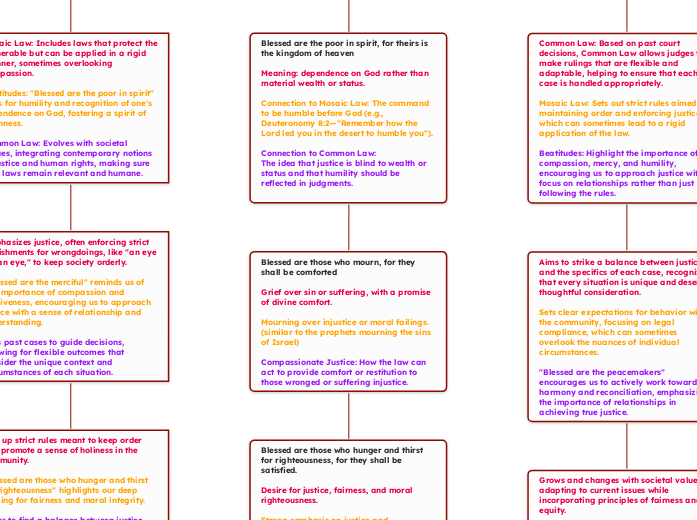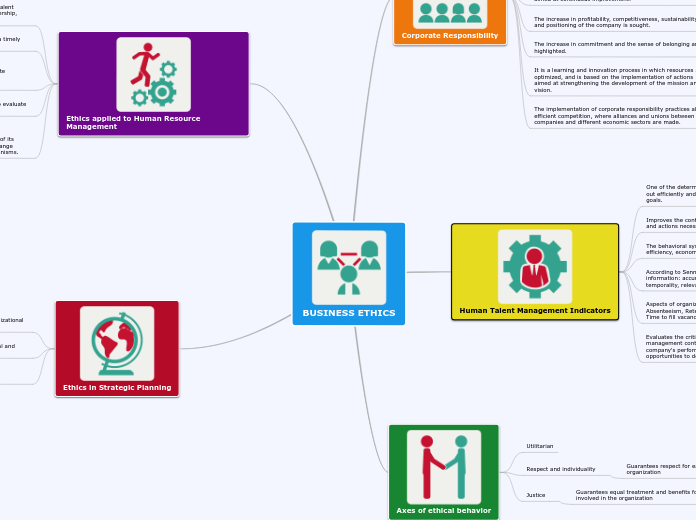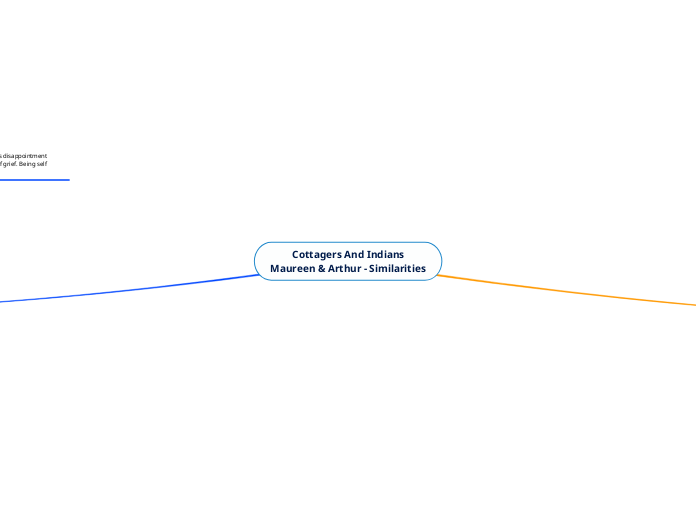Connections Between the Beatitudes, Mosaic Law, and Common Law
Common Law
Common Law: Based on past court decisions, Common Law allows judges to make rulings that are flexible and adaptable, helping to ensure that each case is handled appropriately.
Mosaic Law: Sets out strict rules aimed at maintaining order and enforcing justice, which can sometimes lead to a rigid application of the law.
Beatitudes: Highlight the importance of compassion, mercy, and humility, encouraging us to approach justice with a focus on relationships rather than just following the rules.
Aims to strike a balance between justice and the specifics of each case, recognizing that every situation is unique and deserves thoughtful consideration.
Sets clear expectations for behavior within the community, focusing on legal compliance, which can sometimes overlook the nuances of individual circumstances.
"Blessed are the peacemakers" encourages us to actively work towards harmony and reconciliation, emphasizing the importance of relationships in achieving true justice.
Grows and changes with societal values, adapting to current issues while incorporating principles of fairness and equity.
Grounded in ancient traditions, it reflects the values of its time but may struggle to address the complexities of modern life.
Promote a transformative view of justice that prioritizes love and compassion, guiding how we interact with others in our pursuit of righteousness.
we see different ways of approaching justice: Common Law adapts to changing societal values and focuses on fairness, while Mosaic Law sticks to strict rules to maintain order. The Beatitudes, on the other hand, offer a more compassionate perspective, emphasizing the importance of love and relationships in our pursuit of justice.
Beatitudes
Blessed are the poor in spirit, for theirs is the kingdom of heaven
Meaning: dependence on God rather than material wealth or status.
Connection to Mosaic Law: The command to be humble before God (e.g., Deuteronomy 8:2—"Remember how the Lord led you in the desert to humble you").
Connection to Common Law:
The idea that justice is blind to wealth or status and that humility should be reflected in judgments.
Blessed are those who mourn, for they shall be comforted
Grief over sin or suffering, with a promise of divine comfort.
Mourning over injustice or moral failings. (similar to the prophets mourning the sins of Israel)
Compassionate Justice: How the law can act to provide comfort or restitution to those wronged or suffering injustice.
Blessed are those who hunger and thirst for righteousness, for they shall be satisfied.
Desire for justice, fairness, and moral righteousness.
Strong emphasis on justice and righteousness (e.g., Micah 6:8—"To act justly, love mercy, and walk humbly with your God").
The entire structure of Common Law is based on providing justice and rectifying wrongs.
Blessed are the peacemakers, for they shall be called sons of God.
Peacemakers actively work to bring reconciliation and resolve conflicts.
Mosaic Law encourages peaceful relations, like the commandment to "love your neighbor as yourself" (Leviticus 19:18).
In the legal system, this is similar to conflict resolution and mediation, where the goal is to settle disputes fairly and prevent conflict.
The Beatitudes contrast with the strict Mosaic Law by emphasizing compassion and humility. This shift mirrors Common Law's evolution toward fairness and equity, highlighting that true justice is about love and community, not just rigid rules.
Mosaic Law
Mosaic Law: Includes laws that protect the vulnerable but can be applied in a rigid manner, sometimes overlooking compassion.
Beatitudes: "Blessed are the poor in spirit" calls for humility and recognition of one's dependence on God, fostering a spirit of openness.
Common Law: Evolves with societal values, integrating contemporary notions of justice and human rights, making sure that laws remain relevant and humane.
Emphasizes justice, often enforcing strict punishments for wrongdoings, like "an eye for an eye," to keep society orderly.
"Blessed are the merciful" reminds us of the importance of compassion and forgiveness, encouraging us to approach justice with a sense of relationship and understanding.
Uses past cases to guide decisions, allowing for flexible outcomes that consider the unique context and circumstances of each situation.
Sets up strict rules meant to keep order and promote a sense of holiness in the community.
"Blessed are those who hunger and thirst for righteousness" highlights our deep longing for fairness and moral integrity.
Seeks to find a balance between justice and mercy, allowing for flexibility in how laws are applied to fit the unique circumstances of each case.
The connections between Mosaic Law, the Beatitudes, and Common Law show how our understanding of justice has evolved from strict rules to a more compassionate approach. While Mosaic Law focuses on maintaining order, the Beatitudes remind us of the importance of mercy and humility, and Common Law aims to balance these ideas with flexibility to adapt to individual situations.









